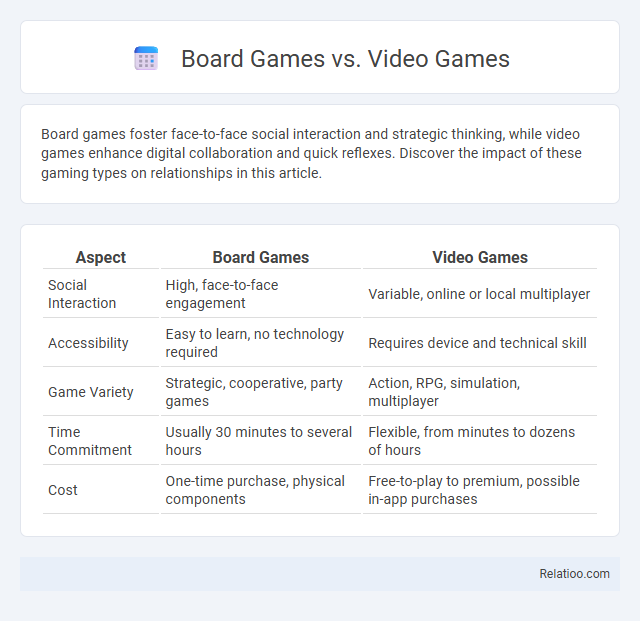Board games foster face-to-face social interaction and strategic thinking, while video games enhance digital collaboration and quick reflexes. Discover the impact of these gaming types on relationships in this article.
Table of Comparison
| Aspect | Board Games | Video Games |
|---|---|---|
| Social Interaction | High, face-to-face engagement | Variable, online or local multiplayer |
| Accessibility | Easy to learn, no technology required | Requires device and technical skill |
| Game Variety | Strategic, cooperative, party games | Action, RPG, simulation, multiplayer |
| Time Commitment | Usually 30 minutes to several hours | Flexible, from minutes to dozens of hours |
| Cost | One-time purchase, physical components | Free-to-play to premium, possible in-app purchases |
Introduction to Board Games and Video Games
Board games offer tactile interaction and strategic depth, fostering social engagement and critical thinking in players. Video games provide immersive digital environments with dynamic storytelling and real-time challenges that enhance reflexes and problem-solving skills. Your choice between these leisure activities depends on whether you prefer face-to-face interaction or virtual experiences.
Historical Evolution of Game Entertainment
Board games trace back over 5,000 years to ancient civilizations like Mesopotamia, evolving from simple strategic challenges to complex, themed experiences that foster social interaction. Video games emerged in the mid-20th century, revolutionizing entertainment by integrating advanced technology, immersive graphics, and interactive storytelling, which transformed passive leisure into dynamic digital engagement. Your leisure activities now integrate both traditional board games and modern video games, reflecting a shift from tactile, face-to-face play toward innovative, technology-driven experiences.
Social Interaction: Face-to-Face vs. Online
Board games foster rich face-to-face social interaction by encouraging direct communication, teamwork, and immediate emotional responses, enhancing Your bonding experience. Video games offer online multiplayer modes that connect players across distances, promoting virtual teamwork but often lacking the tactile engagement of in-person play. Leisure activities involving board games generally build stronger social ties through personal presence, while video gaming provides scalable interaction and global connectivity.
Cognitive Skills and Educational Benefits
Board games enhance strategic thinking, problem-solving, and social interaction, fostering critical cognitive skills through face-to-face engagement. Video games improve hand-eye coordination, multitasking, and spatial awareness with immersive, interactive environments that can simulate real-world challenges. Both board games and video games offer unique educational benefits, promoting memory retention and decision-making abilities essential for cognitive development and lifelong learning.
Accessibility and Convenience Factors
Board games offer tactile engagement and social interaction with minimal technological requirements, making them accessible in environments with limited digital connectivity. Video games provide diverse gameplay experiences and can be accessed anywhere with compatible devices, offering convenience through portability and instant setup. Your choice depends on whether you prioritize in-person interaction or the flexibility of digital entertainment for leisure activities.
Game Design: Physical vs. Digital Mechanics
Board games emphasize tangible components like cards, tokens, and physical boards that engage players through spatial manipulation and face-to-face interaction, fostering social connectivity and strategic thinking. Video games leverage digital mechanics such as dynamic graphics, real-time feedback, and complex algorithms to create immersive environments and adaptive challenges tailored to individual player choices. Your experience varies significantly between these formats, as physical mechanics encourage tactile, communal play while digital mechanics offer expansive, interactive worlds driven by sophisticated programming.
Community and Competitive Play
Board games foster face-to-face interaction and emphasize strategic thinking within small groups, strengthening community bonds through cooperative and competitive play. Video games enable large-scale multiplayer experiences, connecting global communities and offering diverse competitive formats from casual to professional esports. Leisure activities that combine board and video games create inclusive environments that balance social engagement with intense competition, promoting teamwork and friendly rivalry.
Cost Comparison: Investment and Value
Board games generally require a one-time purchase ranging from $20 to $100, offering long-term value through repeated play without additional costs. Video games often involve initial expenses around $60, but you should consider ongoing costs like downloadable content, subscriptions, and hardware upgrades, which can total hundreds annually. Your choice depends on whether you prioritize a fixed investment with social interaction or a potentially higher but variable cost for immersive, solo or online gaming experiences.
Health and Wellness Impacts
Board games promote cognitive skills, social interaction, and stress reduction by encouraging face-to-face communication and strategic thinking, which enhances mental wellness. Video games, particularly those with active or educational content, improve hand-eye coordination, problem-solving abilities, and can reduce stress when played in moderation. Leisure activities like physical exercise and outdoor recreation contribute significantly to physical health, cardiovascular fitness, and mental well-being by reducing anxiety and boosting mood through natural endorphin release.
Future Trends in Gaming Entertainment
Future trends in gaming entertainment emphasize the integration of augmented reality (AR) and virtual reality (VR) in both board games and video games, creating immersive experiences that blend physical and digital play. Advances in artificial intelligence (AI) are enhancing game adaptability and personalization, fostering deeper engagement across various gaming platforms. The rise of social and mobile gaming is expanding accessibility, blurring the lines between traditional leisure activities and interactive digital entertainment.

Infographic: Board Games vs Video Games
 relatioo.com
relatioo.com